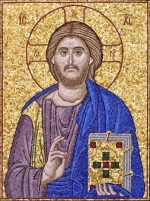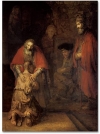Welcome
These reflections are a result of more than 40 years of ministry as a Roman Catholic priest. Most of these years I spent in the Diocese of Charlotte which covers Western North Carolina. Now I am retired, and live in Medellín, Colombia where I continue to serve as a priest in the Archdiocese of Medellín.
WEDNESDAY, WEEK III, LENT
GOSPEL VERSE
Your words, Lord, are Spirit and life;
you have the words of everlasting life.
(Jn 6)
One of the great blessings of Lent is a renewed focus on the Word of God. Whether we simply follow the daily readings from Mass, or we devote ourselves to 15 minutes of Bible reading each day, or we use some spiritual aid like The Word Among Us, Give Us This Day, Magnificat, or The Little Black Book, the most important thing is to read God’s Word. As Simon Peter says to Jesus, “Lord, to whom shall we go? You have the words of everlasting life.”
III SUNDAY OF LENT
Since the Passover of the Jews was near,
Jesus went up to Jerusalem.
He found in the temple area those who sold oxen, sheep, and doves,
as well as the money changers seated there.
He made a whip out of cords
and drove them all out of the temple area, with the sheep and oxen,
and spilled the coins of the money changers
and overturned their tables . . . .
(Jn 2:13-25)
The Cleansing of the Temple occurs near the beginning of the public ministry of Jesus in the Fourth Gospel (according to John). The Synoptic Gospels (Matthew, Mark and Luke) place the event at the end of the public ministry and immediately before the Passion Narrative. We who live on this side of the Resurrection have come “to believe the Scripture and the word Jesus had spoken.”
SATURDAY, WEEK II, LENT
Tax collectors and sinners were all drawing near to listen to Jesus,
but the Pharisees and scribes began to complain, saying,
“This man welcomes sinners and eats with them.”
So to them Jesus addressed this parable.
(Lk 15:1-3,11-32)
The fifteenth chapter of Luke’s gospel is a marvel. It is framed by the eating and drinking with sinners. But what follows are three parables, the Lost Sheep, the Lost Coin, and the Lost Son (the Prodigal Son). In today’s reading we are treated to the Lost Son. The refusal of the elder son to join the banquet celebrating the return of the younger son ties in to the eating and drinking with sinners. Who are those in our church, in our community, in our world, that we would rather not have at the table? Why is it that so many in our world have no place at the table of the human family? Why do so many not feel welcomed?
FRIDAY, WEEK II, LENT
Jesus said to them, "Did you never read in the Scriptures:
The stone that the builders rejected
has become the cornerstone;
by the Lord has this been done,
and it is wonderful in our eyes?
(Mt 21:33-43,45-46)
This passage from Psalm 118 (Ps 118:22-23) is so important to early Christian preaching and teaching about the Crucifixion and the Resurrection that it is cited also in two other passages of the New Testament, Acts 4:11 and I Peter 2:7. It forms an essential part of the liturgy of Easter Sunday.
THURSDAY, WEEK II, LENT
“There was a rich man who dressed in purple garments and fine linen
and dined sumptuously each day.
And lying at his door was a poor man named Lazarus, covered with sores,
who would gladly have eaten his fill of the scraps
that fell from the rich man’s table.
Dogs even used to come and lick his sores.”
(Lk 16:19-31)
In the first century, dogs were pets for sure . . . but the dogs in the street were scavengers. As Jesus tells the story, the rich man dies and is buried. The poor man dies . . . and the dogs get him. What a story . . . for all of us!
WEDNESDAY, WEEK II, LENT
"Whoever wishes to be great among you shall be your servant;
whoever wishes to be first among you shall be your slave.
Just so, the Son of Man did not come to be served but to serve
and to give his life as a ransom for many."
(Mt 20:17-28)
It was March 3, exactly 1,700 years ago today when Emperor Constantine decreed that the “venerable day of the sun,” the Roman dies solis, should be a day off, that is, a public holiday without labor. Christians had of course marked Sunday long before the year 321AD, as the day of Christ’s Resurrection. They had marked it such, however, while the day was a work-day. Constantine changed that, and Sunday now became recognized not only as a specifically Christian holy day but also as a day of public rest.
THURSDAY, WEEK I, LENT
Queen Esther, seized with mortal anguish,
had recourse to the LORD.
(Est C:12,14-16,23-25)
The story of Queen Esther is one of those fabulous Bible stories which captures the imagination. When faced with mortal anguish, Esther knows exactly what to do . . . she has recourse to the Lord . . . she prays, and the Lord triumphs! Today's picture is the painting of Queen Esther (1878) by Edwin Long.










